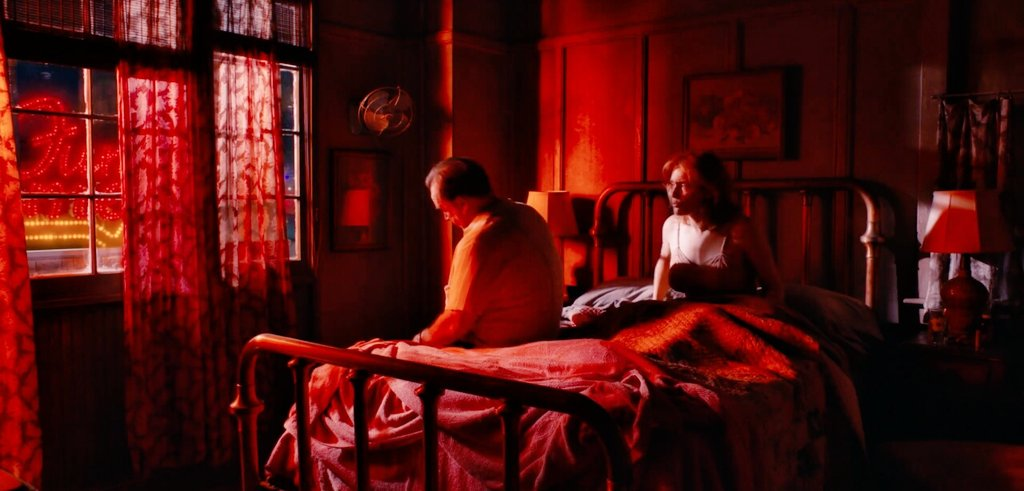It sounds unkind if not cruel to say this, but the invisible subtitle of Woody Allen‘s Wonder Wheel, which I saw this morning, is “I got nothin’ left to say, but I’m gonna say it anyway.”
It’s not a substandard or dismissable film, but it’s not grade-A either. It’s basically a thrown-together stew of familiar Allen-esque elements and influences — a little Chekhov-Seagull action, a little re-frying of Blue Jasmine desperation mixed with A Streetcar Named Desire, a dash of Mary Beth Hurt‘s “Joey” character in Interiors, some gangster seasoning from Bullets over Broadway plus some onions, garlic, celery and sauteed peppers and a little Crimes and Misdemeanors.
But it has some magnificent cinematography by the great Vittorio Storaro. It’s totally worth seeing for this alone.
Wonder Wheel is basically a gloomy stage play — don’t trust any reviewer who calls it a “dramedy” — about a love triangle that ends in doom and despair. For my money it felt too stagey, too “written”, too theatrical. Every doomed character seems to be saying lines, and I just didn’t believe it. I never stopped saying to myself “the writing hasn’t been sufficiently finessed.”
Wonder Wheel‘s tragic figure is poor Ginny (Kate Winslet), a 39 year-old might-have-been actress on her second marriage, living in a Santo Loquasto-designed Coney Island apartment with a pot-bellied lunkhead named Humpty (Jim Belushi), miserable as fuck with a waitress gig at a local clam house and coping with a strange pyromaniac son whom I didn’t care for and wanted to see drowned.
There are two wild cards — a Trigorin-like would-be playwright/lifeguard named Mickey Rubin (Justin Timberlake), and Carolina (Juno Temple), Humpty’s unstable daughter who shows up in scene #1, looking to hide out after yapping to the FBI about her gangster ex-husband and concerned that friends of her ex might want to hurt her.
Early on Ginny falls for Mickey and vice versa to a certain extent. The problem is that Ginny starts to imagine that Mickey can somehow help her escape from her miserable life. But Mickey is just looking for writerly experience and not interested in being anyone’s savior, except perhaps his own.
The second problem is that soon after meeting Carolina Mickey starts to think about easing out of his affair with Ginny and maybe….no, he doesn’t want to be a two-timing shit so he puts it out of his mind, but you know what they say about Mr. Happy. He wants what he wants.
Wonder Wheel is a lament for life’s unhappy losers — for those marginally talented people who never quite made it artistically, or who made one or two big mistakes and never recovered, and who are stuck in a dead-end job or marriage that is making them more and more miserable. It starts out saying “these people are not only unhappy, but nothing they can do can free them from the mud of misery.” It ends up saying “you thought these folks couldn’t be less happy? Well, we figured a way!”
In my book Temple is the stand-out. It’s Kate’s film, of course (she’ll probably end up with a Best Actress nomination), but Temple is stronger because she’s quieter and sadder and isn’t playing the tragic figure in a Blanche Dubois-like manner.
But Kate sure is. Ginny really hates herself, hates her life. On the downslide, delusional, could’ve been a contender, made mistakes that can’t be corrected, tipping towards drink.
The best element in Wonder Wheel, as noted, is Storaro’s lensing. The tints and colors and key-lighting schemes are wonderful, and I love the way he shifts the lighting in the midst of a couple of scenes. I honestly feel that Storaro’s work here is better than Roger Deakins‘ capturing of Blade Runner 2049.
Two mafia guys are looking for Carolina, and so they ask Humpty if he’s seen her. He bullshits them, of course, but he doesn’t worry that they might ask others and maybe figure out that she’s staying with Humpty and Ginny, etc.? Or that she’s working at Ginny’s clam house? Nope — never even occurs to him.
This is the level of writing that we’re dealing with here. Allen needs a whippersnapper collaborator to challenge him and keep him on his toes. Like many of Woody’s films Wonder Wheel feels like something that should have been refined and rewritten before going into production. If it had it could’ve been that much better.
I was with it as far as it went. I’m not putting it down by calling it a B-level achievement for Woody. It’s fine. It’s just not A or A-plus-level.
So I’m sorry but I didn’t believe it the writing, which is to say the melodrama and the overly familiar situations and dialogue. Too well trod, too repetitive, too forced, too “been there before.” But the cinematography is beautiful. Storaro over Deakins, I’m afraid. And Winslet will definitely snag a nomination. (I think.)
Oh, and one last thing. The guy who told me that Jim Belushi gives an award-worthy, guns-blazing supporting performance was wrong. He sold me a bill of goods, led me down the garden path, tied a tin can to my tail. Belushi is just playing a standard meathead, a big guy who isn’t an asshole as much as a beefy none-too-bright with a nascent drinking problem. It’s an okay performance but forget the award-contender dance.

